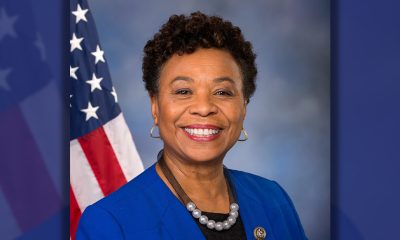Activism
Advocates Want More Black Californians Involved in State’s Transition to EVs
“It’s not enough to build the infrastructure in low-income neighborhoods, the people in those neighborhoods need to have access to the jobs installing and maintaining that infrastructure,” said Charles Dorsey of The Dorsey Group, a Black-owned-and-operated Long Beach-based consulting firm.

Maxim Elramsisy | California Black Media
When Los Angeles hosted its annual car show a little over a month ago at the LA Convention Center, it not only showcased the latest in automotive technology, but the event also transformed into a policy forum on clean energy, previewing what lies ahead for California’s electric vehicle (EV) future.
Battery-powered cars took center stage. They accounted for the majority of the more than 1000 vehicles on display, ranging from cars and trucks to motorcycles, recreational vehicles and semi-trucks.
For Black and other minority advocates in attendance, several concerns emerged. Among them were the impact of the transition to zero emissions vehicles (ZEVs) on Black Californians and how the state will equip low-income neighborhoods with the infrastructure needed when California bans the sale of all gas-powered vehicles in 2035.
“It’s not enough to build the infrastructure in low-income neighborhoods, the people in those neighborhoods need to have access to the jobs installing and maintaining that infrastructure,” said Charles Dorsey of The Dorsey Group, a Black-owned-and-operated Long Beach-based consulting firm.
Speaking on the sidelines of the car show in a meeting room tucked away from showgoers, Dorsey engaged in a lively policy discussion about California’s clean energy future.
“My hope is that this is also an opportunity for us to make a decision to do business with small and growing businesses, understanding that you’re going to have to work with them, so they can get to the same place; and that can be a metric for [success],” Dorsey said. “How many small businesses did we rock with until they became medium businesses because of the contracts that we are intentionally delivering there?”
With an average price of around $58,000 per vehicle, affordability is a significant hurdle for potential EV buyers despite a federal tax credit of $7,500. Concerns about the availability and access to charging stations — often referred to as range anxiety — may also impede adoption, especially in underserved markets where electric infrastructure is less available or apparent.
Advocates for equity say they are hopeful that there will be opportunities for Blacks and others to participate in the clean car value chain.
Plans to build charging stations and related infrastructure to support electric cars are creating new industries and opportunities for labor and manufacturing in the Golden State.
Currently, there are federal incentives for domestic manufacturing and purchasing of domestically manufactured EVs.
With EVs now being more than a quarter of all cars sold in California, policymakers, advocates and industry experts agree that the California automotive economy will be a significant driver of economic transition to zero emission vehicles (ZEVs).
California currently has 93,855 public and shared private electric vehicle chargers, but equity of access remains a concern.
“It’s important that we look at jobs in targeted low-income communities — everything from the innovation and design to manufacturing, production, assembly, construction, installation of these assets. All of those have job components,” said Larry Rillera of the California Energy Commission, speaking during a panel discussion at the car show.
Activism
Oakland Post: Week of April 24 – 30, 2024
The printed Weekly Edition of the Oakland Post: Week of April 24 – 30, 2024

To enlarge your view of this issue, use the slider, magnifying glass icon or full page icon in the lower right corner of the browser window. ![]()
Activism
Oakland Post: Week of April 17 – 23, 2024
The printed Weekly Edition of the Oakland Post: Week of April 17 – 23, 2024

To enlarge your view of this issue, use the slider, magnifying glass icon or full page icon in the lower right corner of the browser window. ![]()
Activism
Oakland Schools Honor Fred Korematsu Day of Civil Liberties
Every Jan. 30, OUSD commemorates the legacy of Fred Korematsu, an Oakland native, a Castlemont High School graduate, and a national symbol of resistance, resilience, and justice. His defiant stand against racial injustice and his unwavering commitment to civil rights continue to inspire the local community and the nation. Tuesday was “Fred Korematsu Day of Civil Liberties and the Constitution” in the state of California and a growing number of states across the country.

By Post Staff
Every Jan. 30, OUSD commemorates the legacy of Fred Korematsu, an Oakland native, a Castlemont High School graduate, and a national symbol of resistance, resilience, and justice.
His defiant stand against racial injustice and his unwavering commitment to civil rights continue to inspire the local community and the nation. Tuesday was “Fred Korematsu Day of Civil Liberties and the Constitution” in the state of California and a growing number of states across the country.
One OUSD school is named in his honor: Fred T. Korematsu Discovery Academy (KDA) elementary in East Oakland.
Several years ago, founding KDA Principal Charles Wilson, in a video interview with anti-hate organization “Not In Our Town,” said, “We chose the name Fred Korematsu because we really felt like the attributes that he showed in his work are things that the children need to learn … that common people can stand up and make differences in a large number of people’s lives.”
Fred Korematsu was born in Oakland on Jan. 30, 1919. His parents ran a floral nursery business, and his upbringing in Oakland shaped his worldview. His belief in the importance of standing up for your rights and the rights of others, regardless of race or background, was the foundation for his activism against racial prejudice and for the rights of Japanese Americans during World War II.
At the start of the war, Korematsu was turned away from enlisting in the National Guard and the Coast Guard because of his race. He trained as a welder, working at the docks in Oakland, but was fired after the bombing of Pearl Harbor in 1941. Fear and prejudice led to federal Executive Order 9066, which forced more than 120,000 Japanese Americans out of their homes and neighborhoods and into remote internment camps.
The 23-year-old Korematsu resisted the order. He underwent cosmetic surgery and assumed a false identity, choosing freedom over unjust imprisonment. His later arrest and conviction sparked a legal battle that would challenge the foundation of civil liberties in America.
Korematsu’s fight culminated in the Supreme Court’s initial ruling against him in 1944. He spent years in a Utah internment camp with his family, followed by time living in Salt Lake City where he was dogged by racism.
In 1976, President Gerald Ford overturned Executive Order 9066. Seven years later, the 9th Circuit Court of Appeals in San Francisco vacated Korematsu’s conviction. He said in court, “I would like to see the government admit that they were wrong and do something about it so this will never happen again to any American citizen of any race, creed, or color.”
Korematsu’s dedication and determination established him as a national icon of civil rights and social justice. He advocated for justice with Rosa Parks. In 1998, President Bill Clinton gave him the Presidential Medal of Freedom saying, “In the long history of our country’s constant search for justice, some names of ordinary citizens stand for millions of souls … To that distinguished list, today we add the name of Fred Korematsu.”
After Sept. 11, 2001, Korematsu spoke out against hatred and discrimination, saying what happened to Japanese Americans should not happen to people of Middle Eastern descent.
Korematsu’s roots in Oakland and his education in OUSD are a source of great pride for the city, according to the school district. His most famous quote, which is on the Korematsu elementary school mural, is as relevant now as ever, “If you have the feeling that something is wrong, don’t be afraid to speak up.”
-

 Activism4 weeks ago
Activism4 weeks agoOakland Post: Week of March 27 – April 2, 2024
-

 #NNPA BlackPress4 weeks ago
#NNPA BlackPress4 weeks agoBeloved Actor and Activist Louis Cameron Gossett Jr. Dies at 87
-

 Community1 week ago
Community1 week agoFinancial Assistance Bill for Descendants of Enslaved Persons to Help Them Purchase, Own, or Maintain a Home
-

 Activism3 weeks ago
Activism3 weeks agoOakland Post: Week of April 3 – 6, 2024
-

 Business1 week ago
Business1 week agoV.P. Kamala Harris: Americans With Criminal Records Will Soon Be Eligible for SBA Loans
-

 Activism2 weeks ago
Activism2 weeks agoOakland Post: Week of April 10 – 16, 2024
-

 Community1 week ago
Community1 week agoAG Bonta Says Oakland School Leaders Should Comply with State Laws to Avoid ‘Disparate Harm’ When Closing or Merging Schools
-

 Community6 days ago
Community6 days agoOakland WNBA Player to be Inducted Into Hall of Fame























































